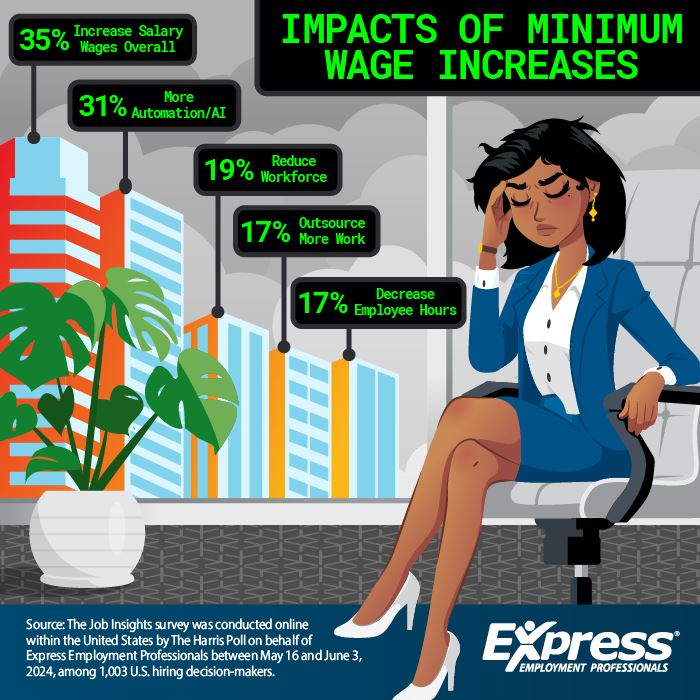 As of July 1, half of America’s 50 states have enacted a minimum wage increase, and hiring managers say if their company is impacted, they may have to make big changes.
As of July 1, half of America’s 50 states have enacted a minimum wage increase, and hiring managers say if their company is impacted, they may have to make big changes.
This is according to a recent Express Employment Professionals-Harris Poll survey.
More than a third of hiring managers (35%) report their company would increase salaries/wages across the board (not just for minimum wage workers) if/when there is a mandatory minimum wage increase.
Around 3 in 10 would utilize/implement more automation/artificial intelligence (31%) in response to mandatory wage increases.
However, 1 in 5 report that they would need to take more drastic measures — including reducing their workforce (19%), outsourcing more work (17%) and/or decreasing the number of hours employees work (17%).
Despite the challenges that may come with a minimum wage increase, most hiring managers and job seekers (86% and 81%, respectively) believe minimum wage should increase to keep up with inflation rates. Fifty-one percent of hiring managers and 19% of job seekers strongly agree with this statement.
The majority of job seekers also say minimum wage increases help the personal finances of minimum wage workers in the long run (76%), but 68% are concerned minimum wage workers will need to worry more about job security.
And in a sign of potential internal strife, 58% of job seekers would quit their jobs if they found out an entry-level employee and senior-level employee had the same salary/wage at their companies following a minimum wage increase.
Mandate Fallout
In Portland, Oregon, minimum wage increased July 1 to $15.95, and Express franchise owner Sara Delafuente says it will likely impact her clients and other businesses in Portland.
“Some may experience higher operating costs, which could lead to price adjustments for their products or services,” she said. “However, there may also be positive outcomes, such as increased employee satisfaction and productivity and a boost in consumer spending power, which could benefit businesses in the long run.
“While the minimum wage increase presents challenges, it allows businesses to innovate and improve. By focusing on efficiency, employee development and strategic planning, companies can absorb the impact of higher wages and thrive in a more equitable economic environment.”
Several thousand miles away in New Hampshire where minimum wage did not increase this year, employers are already paying the “market rate,” according to local Express franchise owner John Roller.
“No one has come close to paying as low of a minimum wage since I moved here in 1983,” he said. “However, if New Hampshire was to increase minimum wage to the mid-to-high teens, businesses and workers that rely on entry-level jobs could be negatively affected.”
For neighboring regions that fall under recent mandated wage hikes, Roller says employers should look for cost savings in all areas with the possibility of raising prices to offset the revenue hit.
“It’s also a great time for businesses to consider flexible staffing solutions, such as temporary- or part-time workers, to manage labor costs more effectively, handle peaks and valleys in workflow and partner with a firm to find the best possible candidates in this competitive recruiting environment,” Delafuente added.
Domino Effect
Roller opposes minimum wage increases that reflect inflation, because of the havoc it can wreak on the market.
“The employment market, like other markets, is best left to itself,” Roller said. “It self-corrects. If an employer pays too little relative to the market, people leave for higher-paying jobs, and the company will have to raise rates to be competitive.
“Reward workers based on work performance, excellence and contributions to the company’s success rather than a mandated wage.”
Conversely, Delafuente believes minimum wage should keep up with inflation, with the caveat of a measured timeline.
“Adjusting the minimum wage for inflation helps maintain the purchasing power of workers, ensuring they can afford basic necessities despite rising costs,” she said. “However, increases must be balanced and gradual to allow businesses to adapt without significant disruption.”
Survey Methodology
The Job Insights survey was conducted online within the United States by The Harris Poll on behalf of Express Employment Professionals between May 16 and June 3, 2024, among 1,003 U.S. hiring decision-makers.
The Job Seeker Report was conducted online within the United States by The Harris Poll on behalf of Express Employment Professionals from May 28 to June 10, 2024, among 1,002 adults ages 18 and older.
For full survey methodologies, please contact Sheena.Hollander@ExpressPros.com, Director of Corporate Communications & PR.
###
If you would like to arrange for an interview to discuss this topic, please contact Sheena.Hollander@ExpressPros.com, Director of Corporate Communications & PR.
About Express Employment Professionals
At Express Employment Professionals, we’re in the business of people. From job seekers to client companies, Express helps people thrive and businesses grow. Our international network of franchises offers localized staffing solutions to the communities they serve across the U.S., Canada, South Africa, Australia and New Zealand, employing 492,000 people globally in 2023 and more than 11 million since its inception. For more information, visit ExpressPros.com.